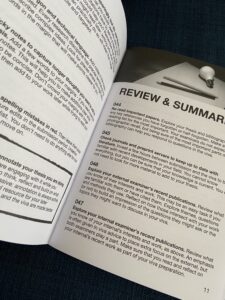Don’t sweat the small stuff.
Do every little thing to help yourself.
These are not contradictions when applied to the viva and viva prep.
When you find a typo after submission, you could underline it or add it to a list, but that’s all you can do. Would it be better to have spotted it in your proofreading? Sure. Is it frustrating? Maybe, but being frustrated won’t help. Fixing a typo won’t be hard later and won’t distract your examiners too much before then.
Small stuff is like that. Distractions like typos, forgetting a detail, or not having a viva date months in advance. If something is frustrating or a problem but you can’t do much about it, let it go. Work around it or work past it, but don’t drive yourself to distraction being annoyed by it.
On the other hand, if you find little things that could help, then try to do them. Add tabs to your thesis, find little opportunities to share your research with others and practise, wear your favourite socks, play your most happy music and follow every tiny idea that could help you get ready for your viva.
A problem doesn’t have to be big and difficult to frustrate your preparation. Put them to one side when you can.
An action doesn’t have to be big or time-consuming to help you get ready. Engage with it when you can.

